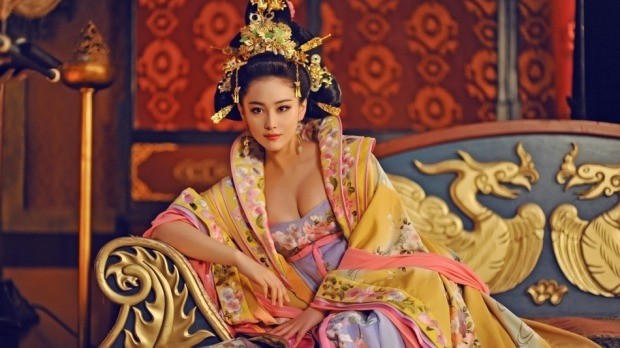After "The Empress of China" television series, also known as "The Saga of Wu Zetian," received some very specific cropping from national regulator the State Administration of Press, Publication, Radio, Film and Television (SAPPRFT), it is difficult not to imagine the most vocal protesters as males.
The only scenes that were affected in the returned show involved exaggerated depictions of women's dresses during the Tang dynasty era (A.D. 618 to 907), which were placed under scrutiny after complaints were received.
Outraged viewers used social media to share their woes, with one protester stating, "I really hate SAPPRFT!" while another declared:
"It's the Tang dynasty--the characters are supposed to have plump bosoms! Now you've cut it so all that's left is a big head. Thumbs down."
However, the latter claim was quickly refuted by a history academic from Tsinghua University, who said that women were free to wear low-cut dresses during the period, but their breasts did not receive the dramatic squeeze-and-lift that the makers of "The Empress of China" enacted.
The historical expert was also responding to comments from other viewers who claimed that the height of a woman's dress during the Tang dynasty determined their social status.
The online storm that erupted over the "reimagining" of one of China's most expensive television series dates back to the end of last year, when it was taken off air by broadcaster Hunan Satellite Television. The revised episodes returned in early January and it became immediately obvious to previously enthralled viewers that the camera had suddenly moved much closer to subjects like actress Fan Bingbing, whose face could be the only thing seen.
As can be seen from this abridged recount of the censorship mini-saga involving "The Empress of China," upset viewers have not displayed any notion of historical accuracy, while the expressions of outrage have failed to articulate a clear and considered rationale for why the actions of the SAPPRFT are, in fact, outrageous. This is why visions of cleavage-hungry Chinese males spring to mind upon reading the media accounts of the protracted incident.
Furthermore, in a Global Times editorial on Monday, a Western-raised expat reveals that female Chinese friends either were unaware of the television show, or were not so concerned that they would upload their thoughts onto the Internet. While the women were also adamant that China's females should be able to wear whatever they want, they made sure that the author was aware that China's views on the representation of women is actually liberal when compared to other Asian societies.



























